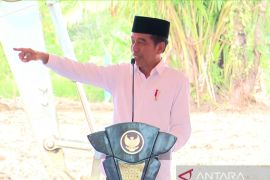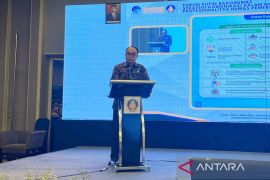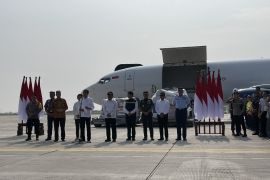Tax amnesty is a basic need of any state."Jakarta (ANTARA News) - It is in the nature of many people to wait until the last minute to deliver their duties, and that also applies to tax evaders who have finally decided to apply for the tax amnesty offered by the Indonesian government since July 2016.
The government has launched its tax amnesty program in an effort to increase tax revenues to help finance infrastructure development programs.
The government asked applicants to pay a two percent penalty in September, but if they pay after September, the penalty will be higher.
The first period for the tax amnesty program is from July 18 until September 30, 2016, offering redemption tariffs of two percent; the second is from October 1 until December 31, 2016 (three percent); and the third period is January 1 until March 31, 2017 (five percent).
In the beginning, some people were pessimistic about the tax amnesty program. Yet, as the first period is nearly over, long queues were seen at banks and tax offices participating in the program, as the tax amnesty applicants wanted to take advantage of the lower redemption tariff offer.
President Joko Widodo (Jokowi) made an impromptu inspection at the Grogol tax office in West Jakarta on Sept. 28 to view the services being provided to those applying for tax amnesties, two days before the closing of the first period.
"Why (everybody) likes to do it at the last minute," President Jokowi noted, in a discussion with tax amnesty applicants.
Several applicants were queuing in two local tax offices during the Presidents visits.
The Head of State was accompanied by Finance Minister Sri Mulyani Indrawati during the visit.
Minister Sri Mulyani has been assigned by the President to coordinate and complete all regulations on implementation of the tax amnesty.
At least Rp4,000 trillion of the fund are expected to be declared by tax amnesty applicants, Rp1,000 trillion of which would be repatriated and invested in the country.
And finally, good news came from Sri Mulyani, who informed the Parliament that Indonesia recorded the highest rate of redemption revenues from a tax amnesty program among countries in the world that have adopted the program.
Until Sept 29, Indonesia recorded Rp89 trillion in redemption funds from the tax amnesty, or 0.65 percent of the GDP, followed by Chile with 0.62 percent of its GDP, the minister told lawmakers of the Commission XI of the House of Representatives during a working meeting on Sept. 29.
"This is a fast development and it is only during the first period of the program. There are still more to come, expected in the second period through December," the minister said.
Indonesia also led in asset declarations, reaching 21.1 percent of GDP, followed by Chile at 8.33 percent, Italy at 5.2 percent, Spain 3.88 percent, South Africa 3.62 percent and India at 2.1 percent of GDP, she said.
The minister noted that most of the assets reported by large tax payers are in the forms of investment and securities, cash and cash equivalent, land, buildings and other fixed assets, claims, stocks and precious metals.
The tax amnesty program succeeded in receiving responses from 68,422 tax payers, who so far have not submitted their their annual income tax report (SPT) , as well as 210,170 tax payers who never submitted correct SPT , 7,899 tax payers registered before the launch of the tax amnesty program, and 11,920 new tax payers.
By Sept 29, redemption funds rose to Rp91.9 trillion from repatriated funds of Rp124 trillion, as well as asset declarations abroad of Rp848 trillion and asset declarations in the country of Rp2,061 trillion, as total asset reporting based on SPT reached Rp3,032 trillion.
Earlier, President Jokowi said public enthusiasm over the tax amnesty program would provide the necessary momentum to improve the taxation system in Indonesia.
"This provides the momentum to improve our taxation (system). There is (widespread) public awareness (of the need) to pay taxes. Our goal is to develop trust based on this momentum," President Jokowi remarked.
In response to the response to taxation reform, supporting laws on income tax and value added tax will be introduced for the improvement of the countrys taxation system.
During the inspection, the President received an evaluation recommending the improvement of the taxation administration and service systems.
The president claimed he had received many requests to extend the program, and he promised to provide administrative facilities through December 2016.
He also acknowledged the investments and inflow of money into the country. "We encourage those who have money stashed outside the country to continue allowing it to flow into the country," he said.
The Presidents inspection was lauded by Misbakhun, a Member of Parliament, saying that the visit of the President reflected his commitment to make the program successful.
He stated that the issuance of Law Number 11 of 2016 on tax amnesty would help mitigate the chronic problem of Indonesia having sub-optimal tax revenues.
The tax amnesty program is expected to enhance the state income accruing from taxes. Also, it will improve and update the database of taxpayers and bring in thousands of trillions of funds in rupiah that some citizens had deposited in foreign lands.
"Tax amnesty is a basic need of any state. If citizens wish to carry out development programs by themselves, they must be fully aware about their obligations and pay taxes, including through this tax amnesty program," he stressed.
The politician from the Golkar Party expressed his optimism that the tax amnesty scheme will achieve its income target.
Meanwhile, Coordinating Minister for Economy Darmin Nasution said earlier that he was optimistic that the amnesty would run more effectively until the end of the program.
Among the benefits offered to those taking part in the tax amnesty program include abolition of taxes not paid in the past, no tax administrative sanctions or criminal sanctions, and that the data would not be used for legal investigations.
After the end of the program, failure to pay taxes or tax evasion would be legally pursued.
The government has warned, that in 2018 it would no longer be possible for tax payers to hide assets to evade paying taxes, as Indonesia would take part in an international system of transparency.
(T.F001/INE/KR-BSR/O001)
Reporter: Fardah
Editor: Priyambodo RH
Copyright © ANTARA 2016












